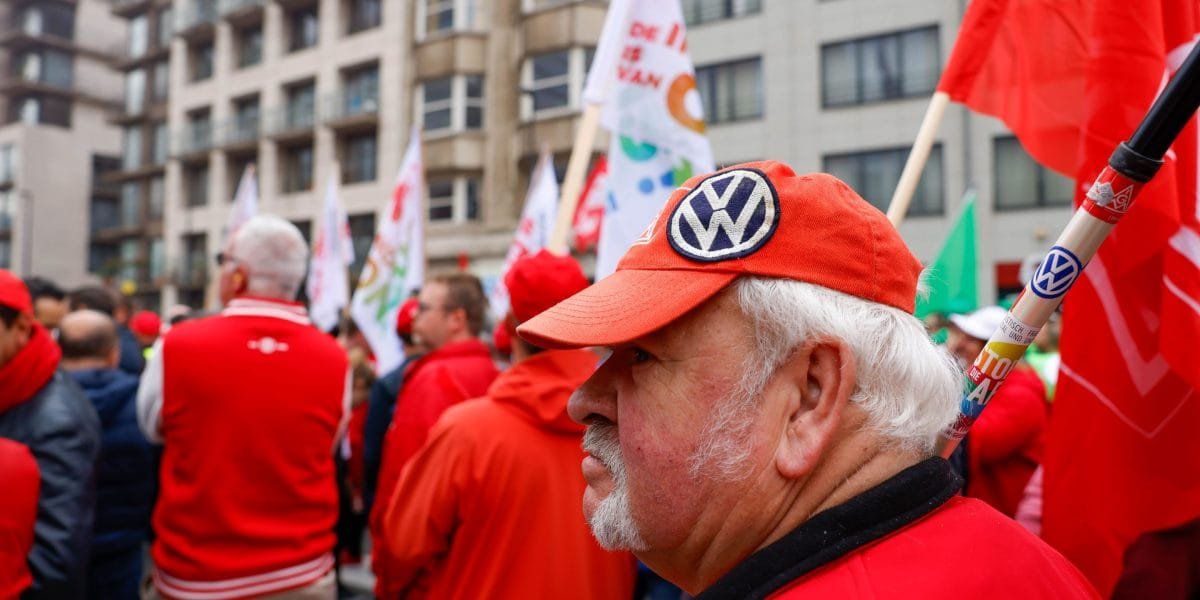Volkswagen has been in trouble, as have its employees. The carmaker is Germany’s crown jewel—the country’s largest company and most significant private employer.
Since Volkswagen announced possible plant closures earlier this month, the company’s sprawling workforce has been rattled. The Wolfsburg-headquartered giant has also retracted its historic job security pledge, exposing scores of workers to the prospect of losing their jobs imminently.
The impact won’t be small. Over 15,000 workers could face job cuts as Volkswagen considers shutting two or three factories in the coming months, Jefferies analysts wrote in a note Monday. Roughly 120,000 of the Volkswagen brand’s 200,000 employees are Germany-based.
In Wolfsberg specifically, half of the supervisory board’s seats are held by labor representatives, which could swing decisions in the union’s favor. However, the analysts said that Volkswagen’s factory closures might not need the supervisory board’s approval, which could lead to a possible provision of up to €4 billion in closure costs, Jefferies wrote in its note following conversations with Volkswagen executives in North America.
“The rationale to re-size VW’s namesake is not new but management’s sense of urgency and determination to tackle excess capacity and spending patterns both are,” the analysts said. “There is risk of plant disruption, but unions can only strike on pay, not plant closure or layoffs if the latter are not contractually protected.”
Volkswagen declined to comment.
What’s at stake for Volkswagen?
As Volkswagen navigates growing competition for its cars and increasing costs, the future of several of its employees hangs in the balance. The company is tussling with its union over how it could roll out some of the changes around factory closures and the resulting threats to jobs, especially after Volkswagen dismantled its three-decade-old provision for job protection.
Europe’s top carmaker has defended its decision as it tries to achieve its €10 billion cost-cutting goal announced last year. Volkswagen CFO Arno Antlitz also pointed out the staggering difference in how the company wasn’t able to make as many cars to justify its factory capacity.
“We (Volkswagen Group) are the largest manufacturer with around a quarter of the market share in Europe. We are short of around 500,000 cars, the equivalent of around 2 plants,” he said earlier this month when addressing employees at the company’s headquarters, according to Reuters. “And that has nothing to do with our products or poor sales performance. The market is simply no longer there.”
Volkswagen will face an uphill battle despite its need for plant closures. It faces fierce unions ready to fight it on measures that threaten its workforce. They’ve also said that the auto company’s move could result in strikes and cost them €1 billion.
The effects have already spilled over to other countries. Last week, workers in Volkswagen-owned Audi factories in Brussels stole keys in protest of the automaker’s plans, and there have been large-scale demonstrations as a result.
Germany has been hit with too many problems at once, of which underinvestment and sluggish economic growth are among the key ones. If Europe’s most important company continues struggling and eyes the axe for jobs, the ripple effects could hurt the broader German industry and its competitiveness.
Still, Volkswagen seems determined to see its factory closures through, as its management officials told Jefferies that there was “no plan B that would rule out capacity reduction.”
Source link
